Blog
Coupon Codes Gone Wild
For pretty much every etailer name I type into Google’s search box I get a prompt with a variation of “coupon code” in it. Screenshots-
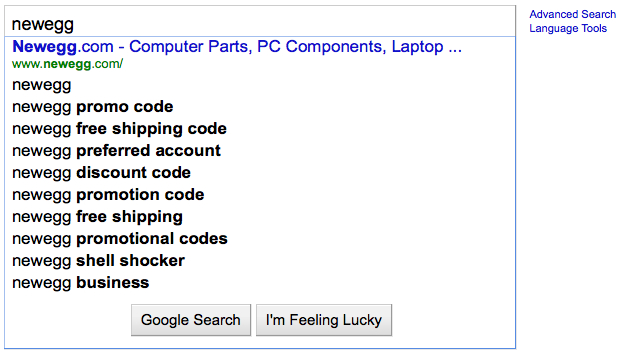
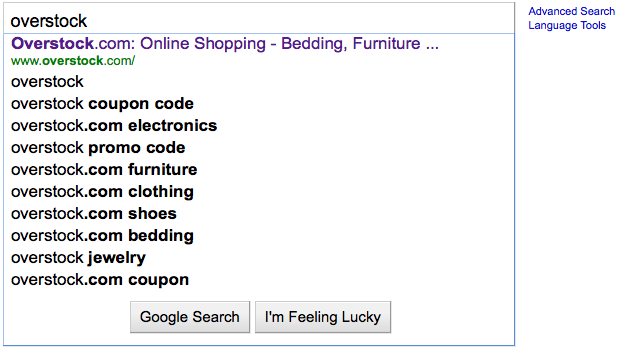
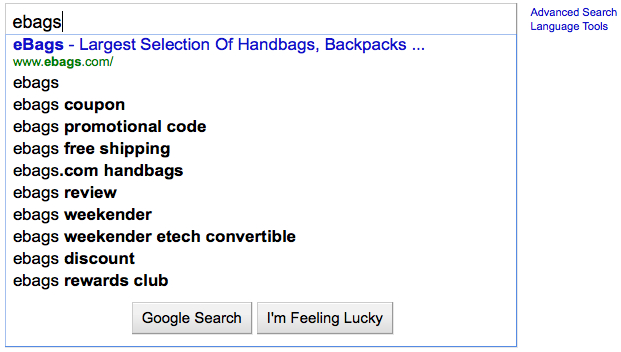
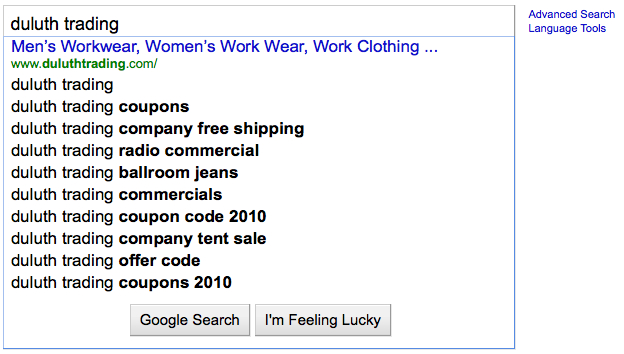
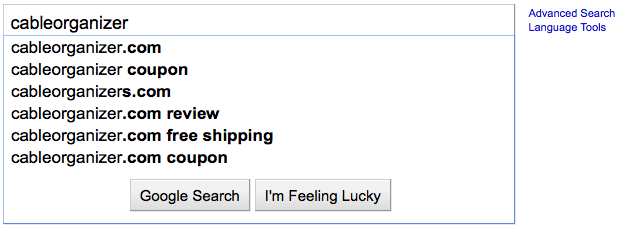
These are literally the first five companies I ran the test for. Start typing the name of your favorite etailer into Google and see what happens.
So, what is the solution? Is there a SEO workaround? Should the etailer accept reality and develop/enhance their coupon code strategy? If we ask Google to remove coupon variations from the prompt list would they comply?
Update: Get Elastic blog suggests that retailers create dedicated landing pages optimized for their own coupon codes because there’s a good chance the store’s domain will outrank the affiliate sites. Another suggestion was given by Dan Barker (a commenter to their post). Dan suggests creating a ‘coupon codes’ page that can’t be indexed, and *only* publicize it via PPC.
My suggestion is to do what Get Elastic recommends but instead of listing all your coupon codes list 10 and market it as that week’s promotion. Most coupon hunters will scan the list and if they don’t find their coupon they’ll just buy the item at full price. Some might leave the site and hunt other coupon sites. One easy way to test this strategy is by running a split test where 50% see all coupons on the landing page and 50% just see the 10 promoted ones. Let the test determine which performs better.




Comments 5
I read about one strategy where you create your own page on your site that incorporates these keywords, so at least you can capture the traffic yourself.
You’ll almost always rank first for any topic related to your company name.
You can just accept reality and then create a page that offers some kind of a coupon code to at least capture the sale, even at a discount.
I don’t think there’s anything Google will do to prevent that from showing up. Seems like there was a case where some soccer player wanted to sue Google because one one of the first auto suggest searches about his name included a keyword that would bring into question his sexual preference.
ReplyFound the page where I read about that strategy.
https://www.getelastic.com/easy-seo-tip/
Replybetterretail
I’m a regular reader of getelastic.com but obviously missed this post. Thanks for pointing it out. I like the strategy proposed by Linda Bustos and also the suggestion made by Dan Barker (a commenter). Dan’s suggestion is to make a dedicated page for the coupon codes but prevent it from being indexed. His idea is to use that page for PPC. You can read his exact strategy by revisiting the post (https://www.getelastic.com/easy-seo-tip/) and scrolling to comment #6.
PS: Good to learn about the unlucky soccer player.
ReplyThere’s nothing you can do to prevent Google from serving up these suggestions. In fact, the suggestions are a close proxy for the query volume for that root keyword.
So, like it or not, ‘coupon’ is often the most popular modifier of a retail brand.
Creating a coupon page on your own site and having it rank well for that term is a decent strategy. If you do this, I’d use some messaging that included the fact that the coupons would always be accurate and inclusive – the pitch being that you don’t need to go anywhere else and waste your time with expired codes.
However, you may have to weigh the relationships you have with these sites. If you’re currently relying on them for traffic and sales, this strategy might convince them to promote your site less to their own user base.
In the end, it comes down to your coupon strategy. If you’re using a lot of coupons with long expiration dates, you’re simply not going to prevent them from being distributed.
This means you can either adjust the coupon strategy to ensure your margins are still in tact and bank on additional volume from wide coupon distribution OR you can shorten the expiration dates or build other technical hurdles to ensure coupons are used by the intended targets more frequently.
Replybetterretail
“I’d use some messaging that included the fact that the coupons would always be accurate and inclusive” that’s an excellent suggestion.
Reply